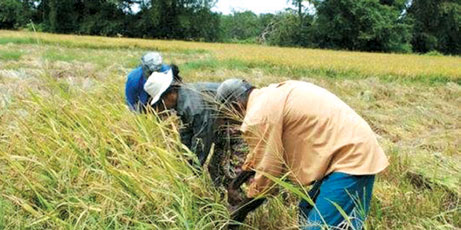Call to protect paddy farmers - Analysts
by Gamini Warushamana
Continuous market failure in the paddy sector will create a serious
impact on the growth of agriculture and policy decisions have to be
taken immediately to address these issues, analysts warned.
Paddy farmers faced difficulties again in selling their Yala harvest
as prices have dropped sharply due to oversupply.
 Sources in Ampara, Mahaweli zones and other paddy farming areas said
that the state agency, the Paddy Marketing Board (PMB), had stopped
purchasing paddy. Sources in Ampara, Mahaweli zones and other paddy farming areas said
that the state agency, the Paddy Marketing Board (PMB), had stopped
purchasing paddy.
Mahaweli officials in Wilikanda, Mahaweli Zone B, said that only
private traders purchase paddy and that too at Rs 25-30. The estimated
harvest this Yala season is 1.5 million tonnes and 2.7 million tonnes
was harvested during the last Maha season.
Chairman of the PMB, K.B. Jayasinghe said that the PMB was now
purchasing paddy only in the Hambantota area and operations in other
areas have been stopped due to a shortage of funds.
“This Yala season we have purchased around 29,000 tonnes of paddy,
the highest ever purchased in a Yala season. The low quality of paddy in
the Ampara area is the reason for it fetching the lowest price in the
open market,” he said.
Massive production in traditional farming areas, new lands in the
Northern and the Eastern provinces and farmlands under new or renovated
irrigation systems have created a huge oversupply, contributing to
marketing issues. The PMB has a limited capacity to store paddy and
there is a stock of 128,000 tonnes of the previous year's harvest in PMB
stores, he said.
Director of the Business Development Department of the Mahaweli
Authority said that the Authority does not purchase paddy and all
warehouses of the Authority have been given to the PMB.
In the Polonnaruwa district paddy purchasing is done under the
District Secretary's supervision.
The Government intervenes in the market every year with a stipulated
high price to influence market price.
However, with financial and storage capacity limitations, the PMB can
purchase only a fraction of the harvest and its impact is insignificant.
Therefore, it is time to consider alternative solutions to the issue,
analysts said.
According to the Director General of Census and Statistics, this
issue is connected to socio-economic changes. While rice production is
increasing, rice consumption is gradually declining. Today per capita
rice consumption is 112 kg per year.
Bumper harvests during the past few years helped to keep rice prices
stable and ease the cost of living. Despite a huge campaign to promote
rice consumption, the demand for bread and wheat flour-based food is
high. The reason is that the lifestyles of the people have changed and
consumption patterns are also different.
Another development is that the demand for red rice has declined
sharply. Jayasinghe said that reason for this trend is not known.
According to household income and expenditure survey data, the
consumption ratio in Sri Lanka is also declining and according to the
latest data, the food ratio is 38 percent and non-food ratio is 62
percent. Normally this happens with increasing income but here it is not
due to increasing income.
Over 50 percent of the working people earn less than Rs. 25,000 per
month and there is no significant increase in their income.
However, as a result of sharp price increases in non-food items,
people have reduced consumption and the consumption ratio has declined.
Sharp increases in the prices of electricity, gas, transport,
telecommunication, education and health services have contributed to
this trend.Reallocating land for other high value crops, reducing paddy
production and cultivation of high quality rice varieties for the export
market are options that could be considered.
The Government can intervene in addressing some issues such as
purchasing red rice for school childrens' meals, hospitals, security
forces and prisons.
The export of excess rice production is a popular solution proposed
by politicians.
However, according to a research report published by the Institute of
Policy Studies (IPS) bulk rice export too is not feasible immediately.
It is also not socially profitable under present conditions and the
option is to export to small niche markets.
These markets comprise the Sri Lankan diaspora where there is a
limited demand for 'Samba' and red rice and another limited market for
special varieties such as red pericarp long-grained rice.
Jayasinghe said that a huge campaign should be carried out to
increase rice consumption and the Ministries of Health and Education
should be involved in it. Rice consumption is low in the estate sector
and a program is needed to supply rice at low prices to the estate
sector. |

